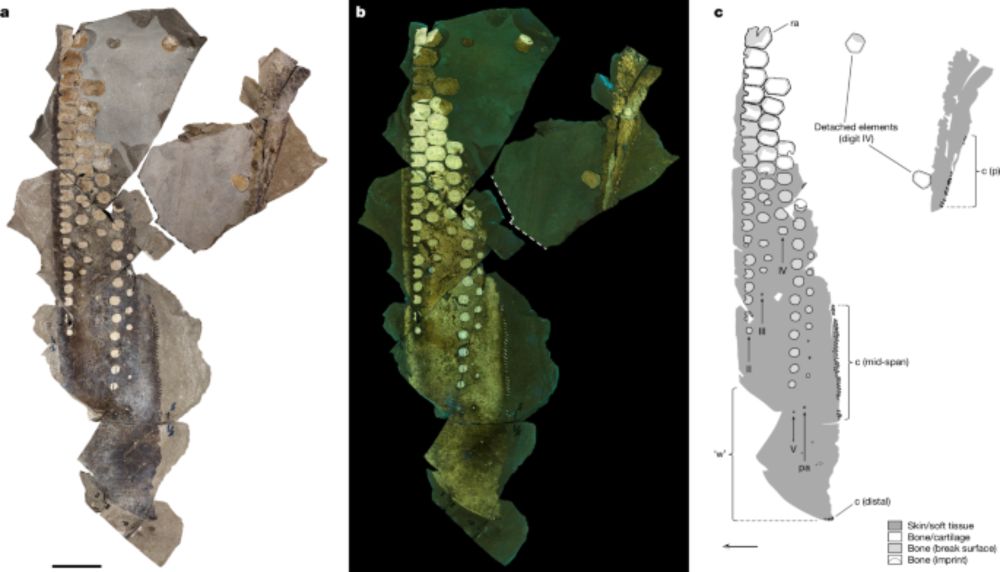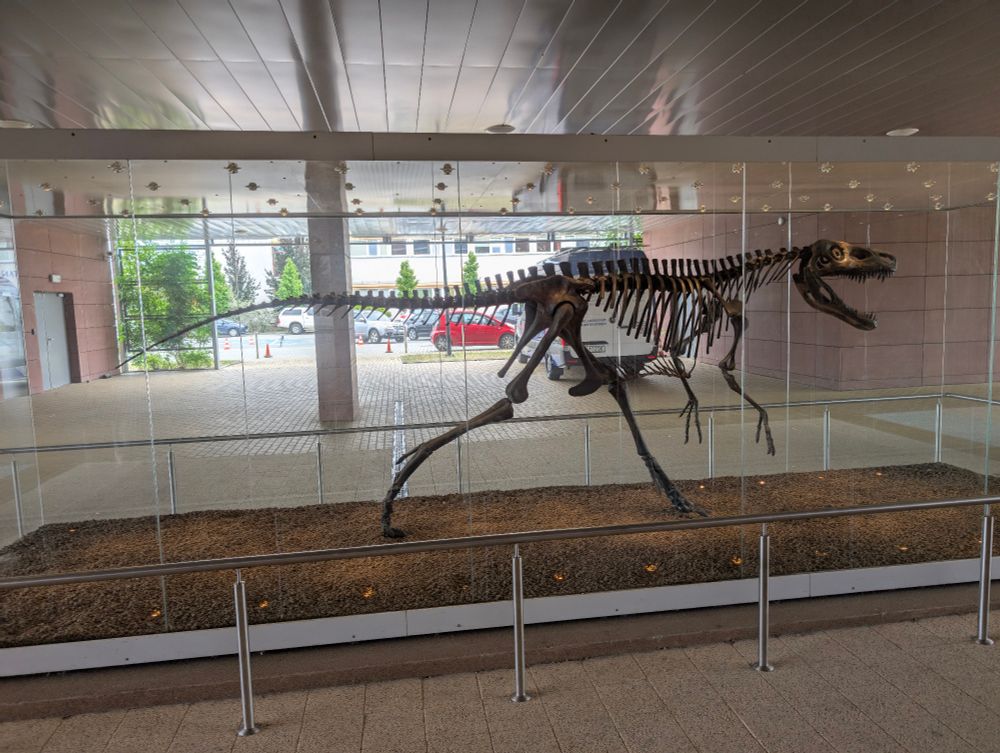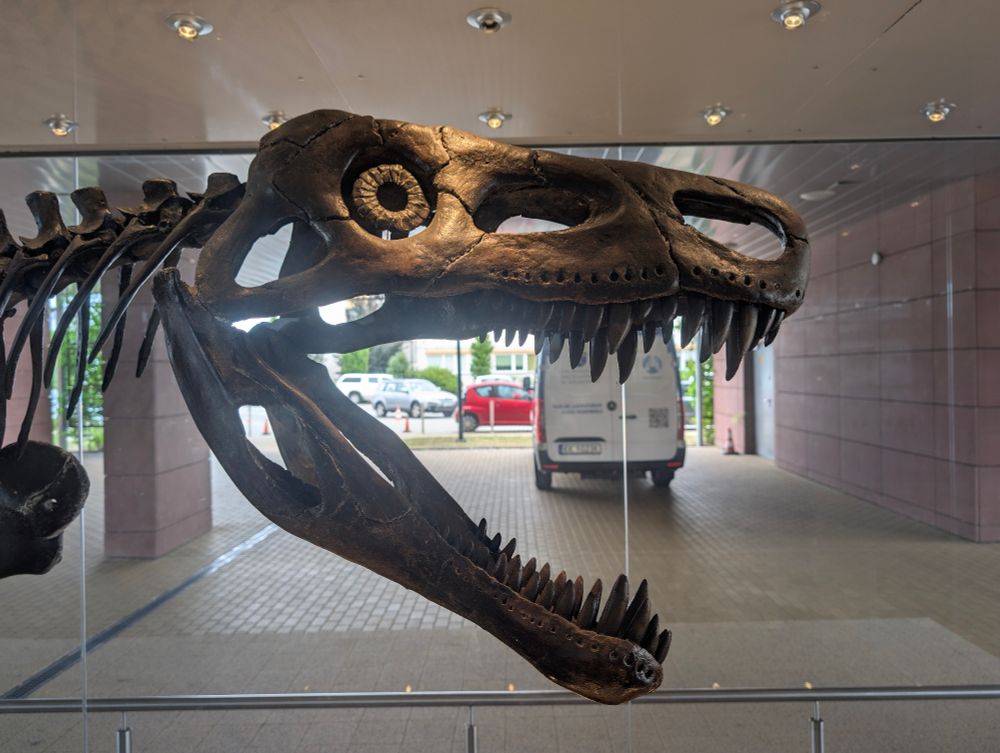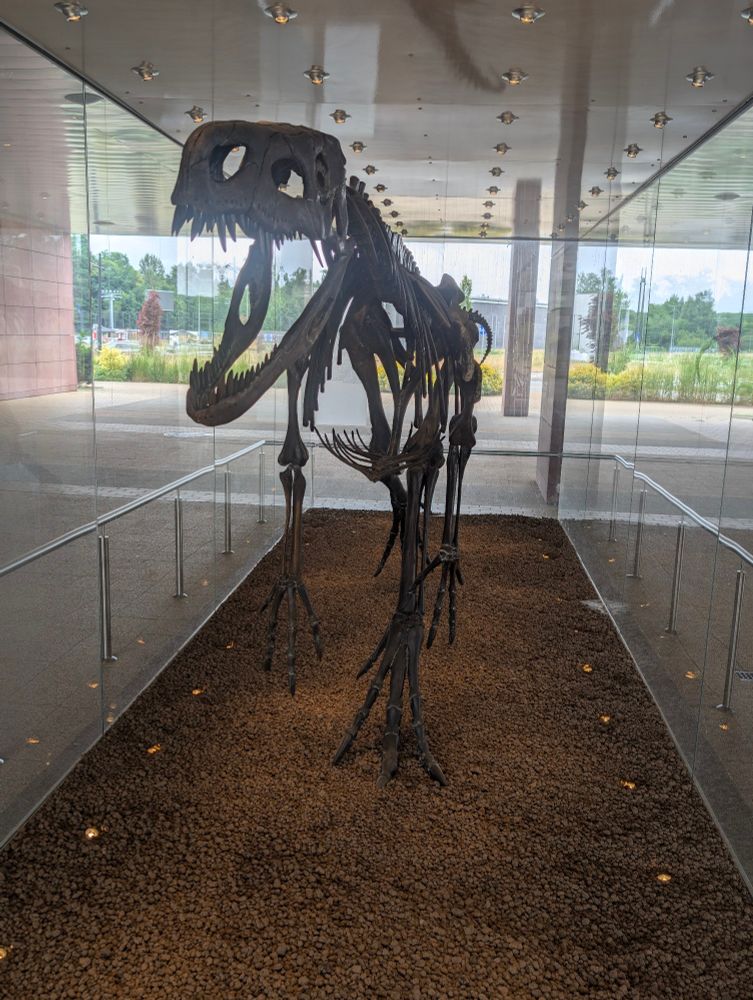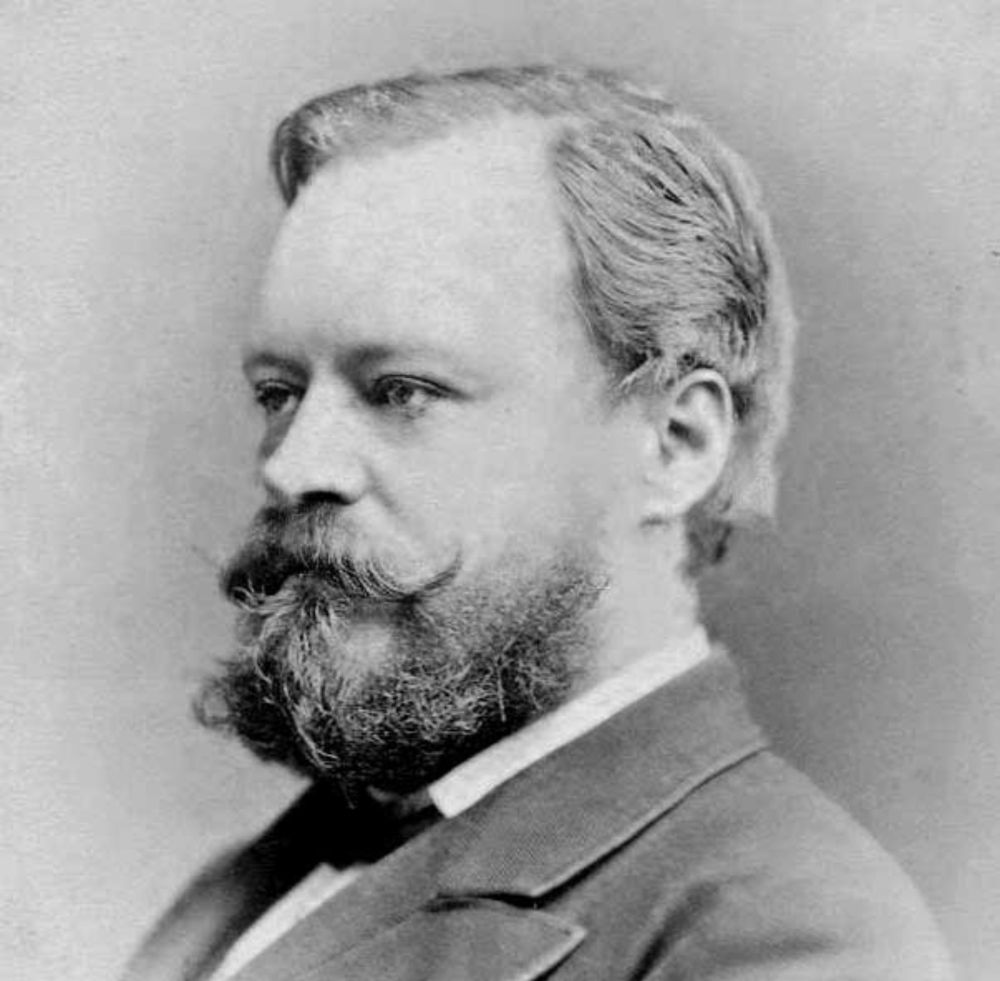A new page will be added on Monday, when our paper on a new plesiosaur genus and species from Germany is out.
2/2
01.08.2025 08:26 — 👍 4 🔁 1 💬 0 📌 0
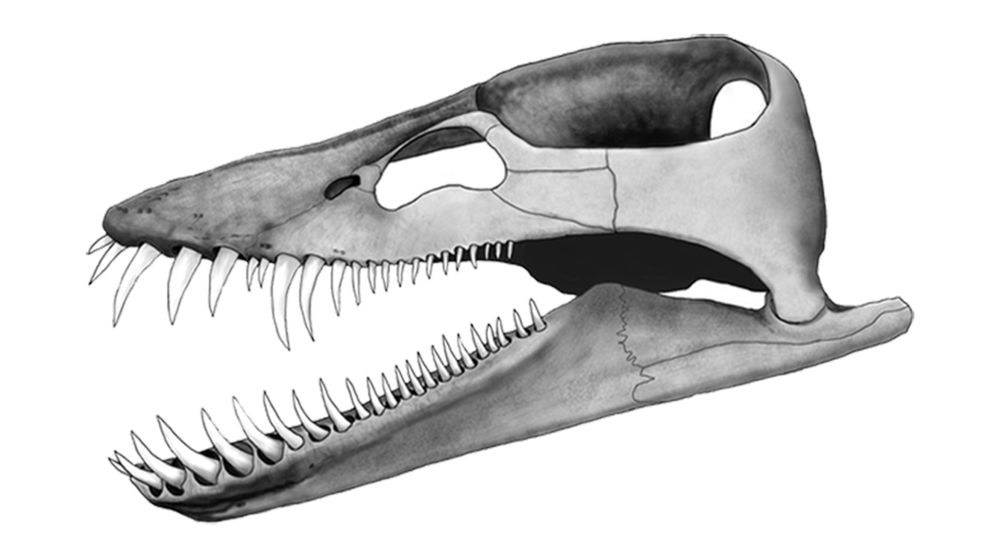
Start – Sachs Vertebrate Palaeontology Research
My name is Sven Sachs and this website introduces the research of me and my colleagues in the field of palaeoherpetology (a subfield of vertebrate
I'm happy to announce my new website.
Here, you'll find PDFs of my publications, an overview of my research, and an introduction to the new taxa I have established.
I will add new content over time. I hope you'll find it informative!
Little teaser: 1/2
www.sachspal.de
#FossilFriday #paleontology
01.08.2025 08:26 — 👍 16 🔁 5 💬 1 📌 0
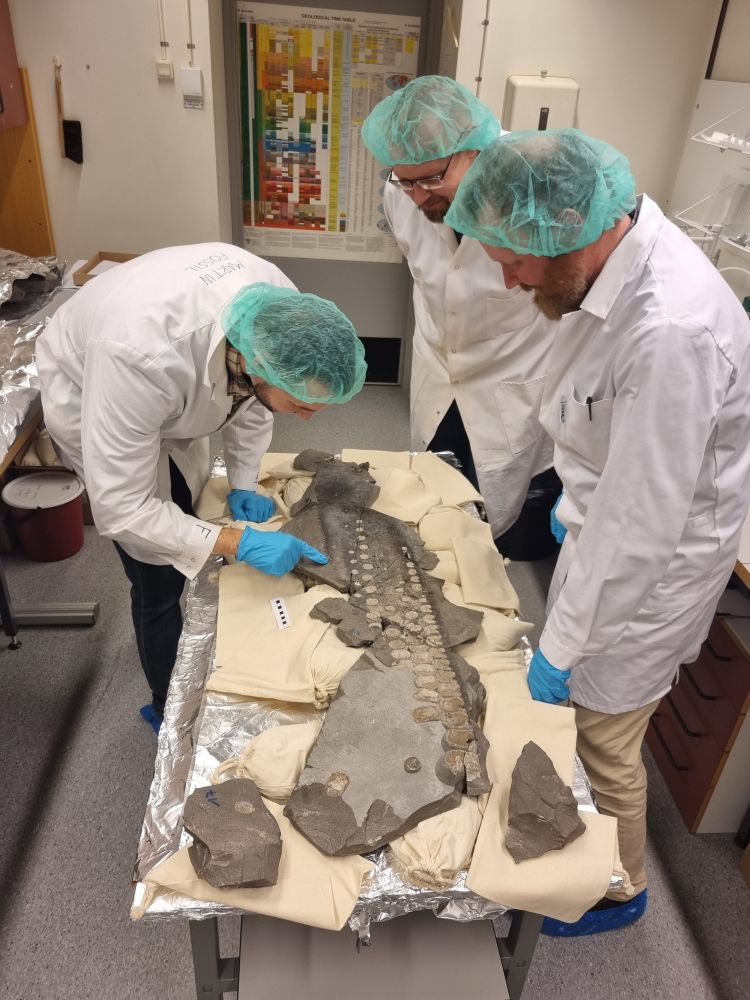
Dean Lomax, Sven Sachs, and Johan Lindgren, examining the Temnodontosaurus flipper with serrated trailing edge
I'm grateful to the finder, Georg Göltz, for contacting me, allowing its description, and donating this significant specimen to the Palaeontological Museum in Nierstein. Thanks also to project leader Johan Lindgren, my co-author Dean Lomax, and to Joschua for the fantastic palaeoart! 6/7
16.07.2025 17:03 — 👍 11 🔁 0 💬 1 📌 0
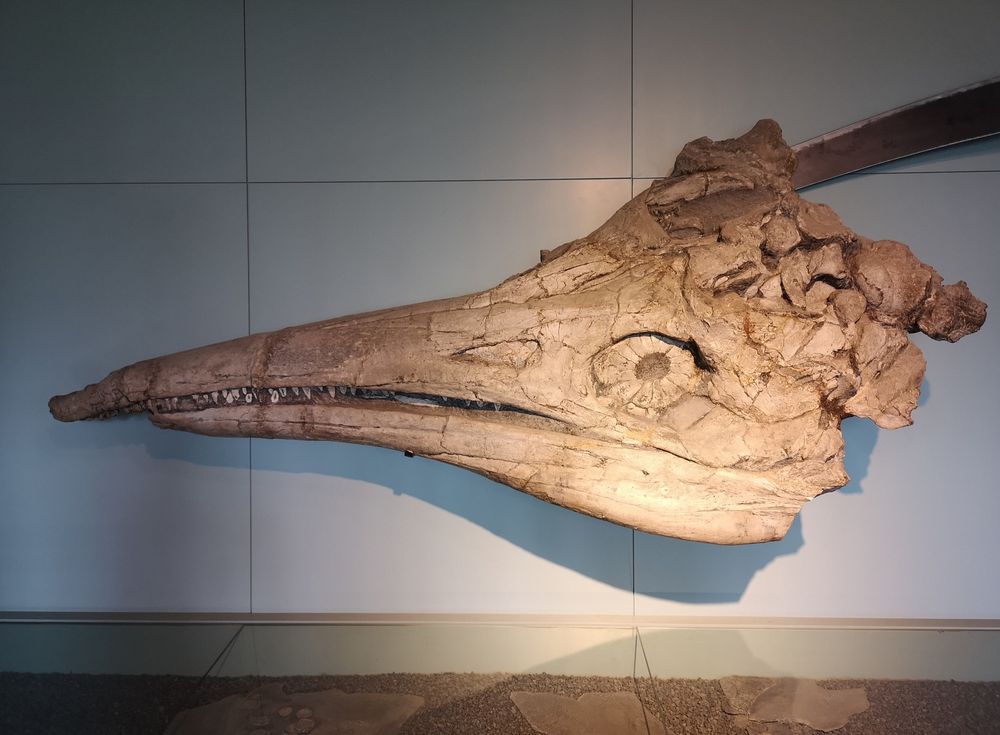
Temnodontosaurus skull at Kloster Banz, Germany
Temnodontosaurus had the largest eyes of any vertebrate known, which support the hypothesis that this aquatic reptile hunted under low-light conditions. 5/7
16.07.2025 17:03 — 👍 9 🔁 0 💬 1 📌 0
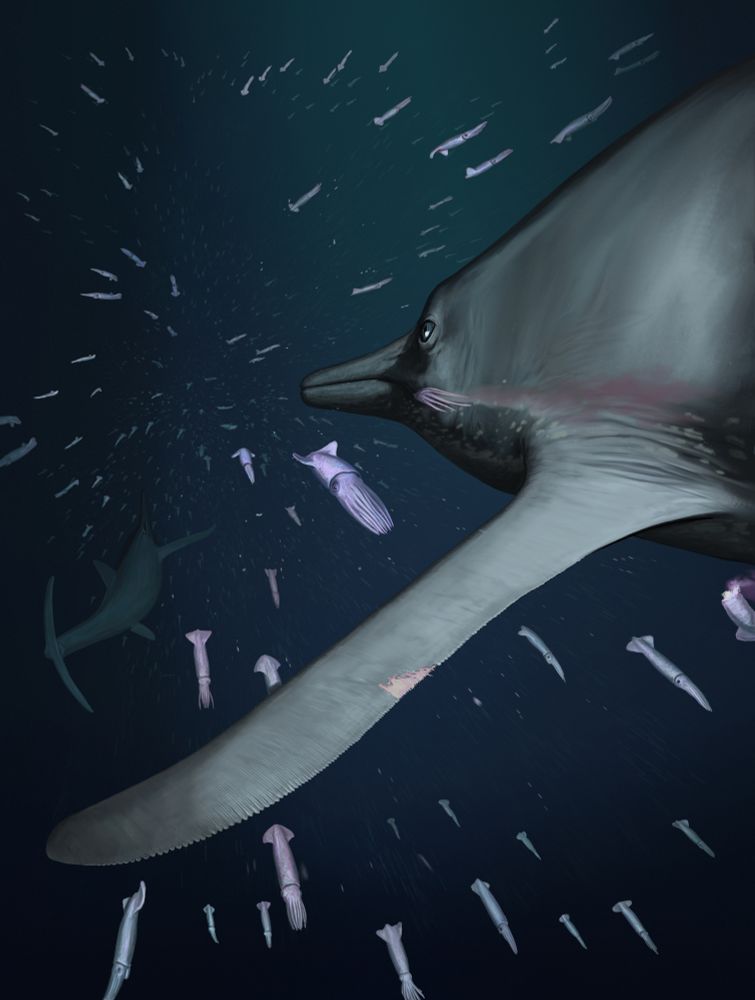
Temnodontosaurus life reconstruction, showing a flipper with 'chondroderms, by Joschua Knüppe
This, together with the flipper's wing-like shape and serrated edge, collectively indicates that this morphology helped the massive animal to minimize sound production during swimming. 4/7
16.07.2025 17:03 — 👍 8 🔁 1 💬 1 📌 0
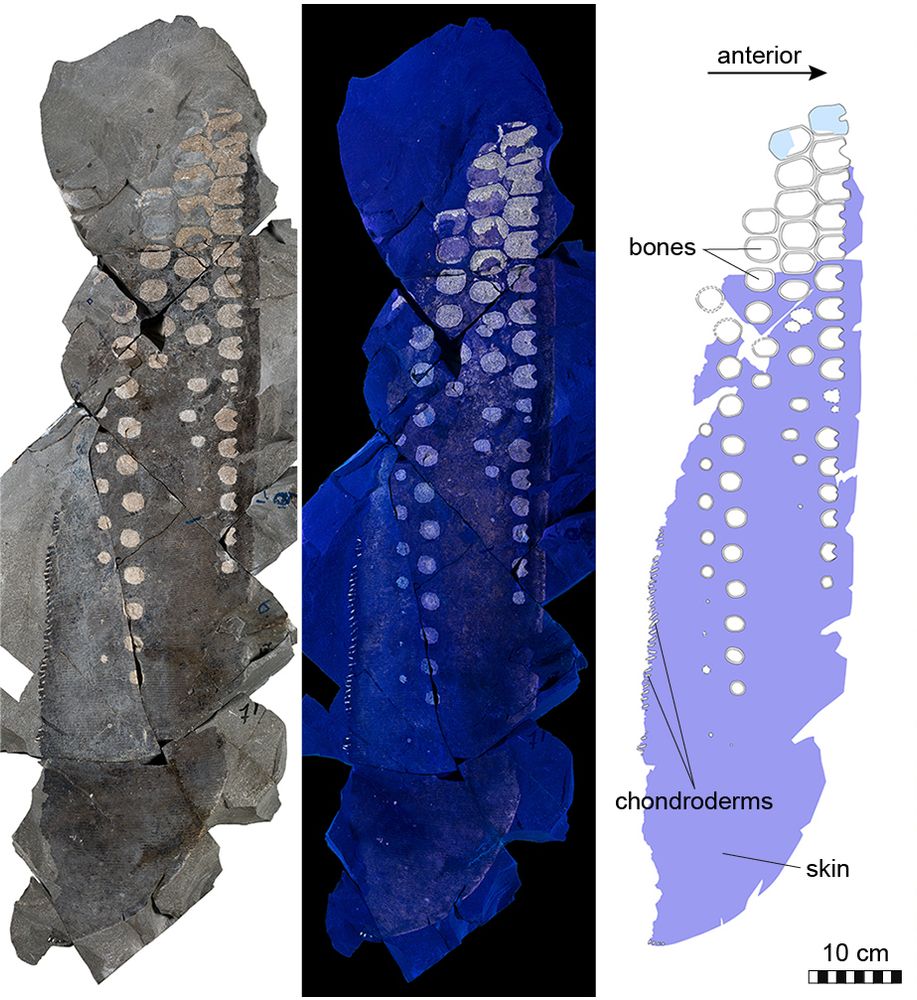
Temnodontosaurus flipper with soft-tissue preservation from Dotternhausen, Germany
Temnodontosaurus was the largest megapredator of the Lower Jurassic (more than 10 m long). The flipper lacks bones at the distal end, which show that the soft-tissue flipper was much longer than the bones indicate. 3/7
16.07.2025 17:03 — 👍 9 🔁 0 💬 1 📌 1
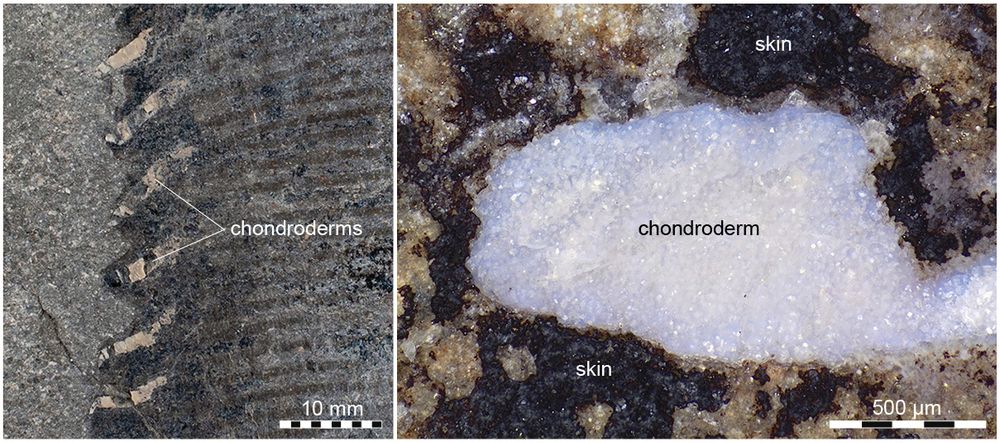
Chondroderms in the Temnodontosaurus flipper
The nearly 1m-long front flipper, found in 2009 by Georg Göltz in Dotternhausen, Germany, is Lower Jurassic in age. It preserves a serrated trailing edge with unique rod-like structures we've named 'chondroderms.' 2/7
#paleontology #biology #germany
16.07.2025 17:03 — 👍 8 🔁 0 💬 1 📌 0
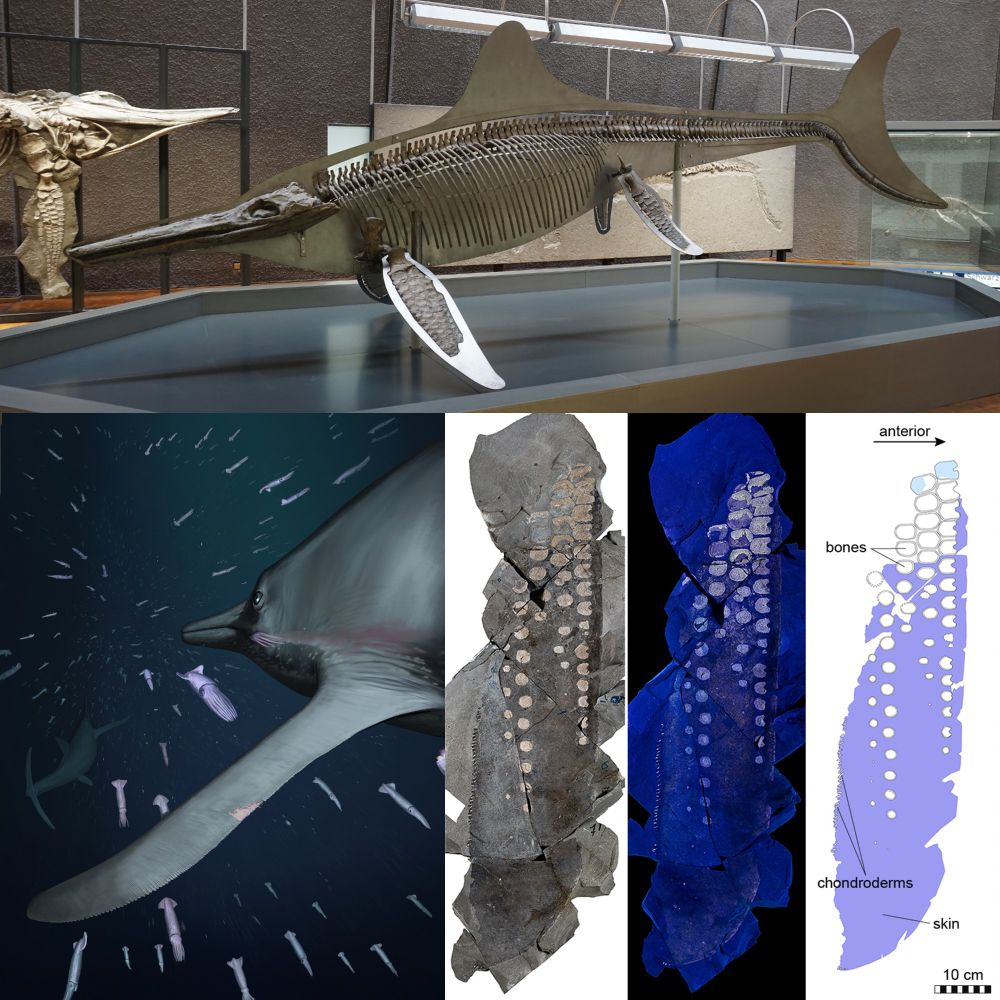
Temnodontosaurus skeleton, close-up of the soft-tissue, and flipper illustration with 'chondroderms'
Big news! Our study, just out in Nature, is a game-changer for giant ichthyosaurs! We describe the first Temnodontosaurus flipper with fossilized soft tissue, giving us a unique look at how these massive creatures used stealth while hunting in darkness. 1/7
#science #news #scicomm
16.07.2025 17:03 — 👍 55 🔁 15 💬 1 📌 3
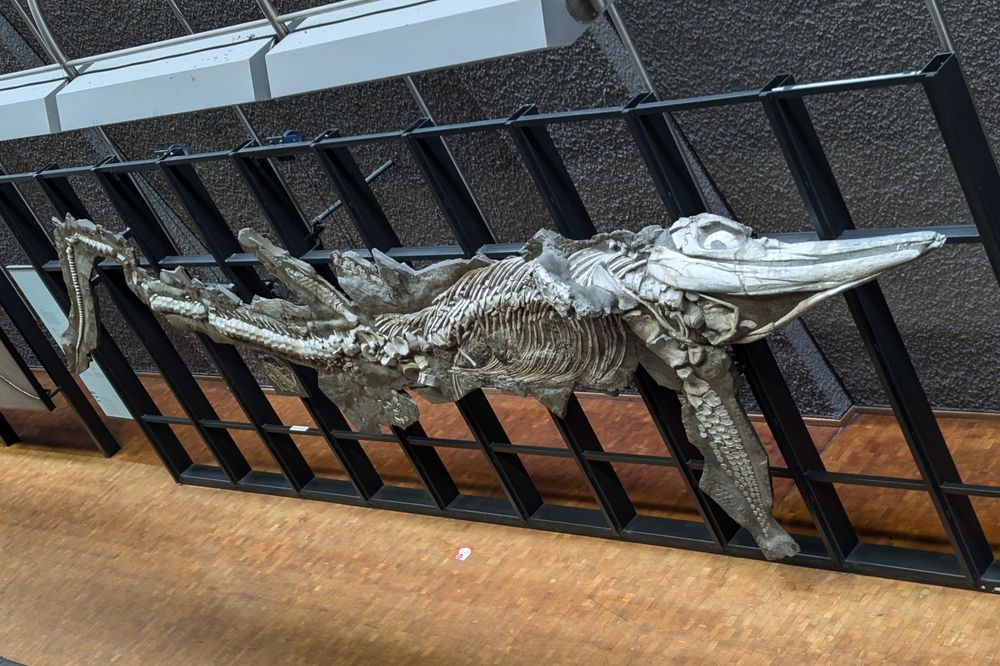
Temnodontosaurus skeleton in Stuttgart
Fantastic news!
I've just been informed that an important study I'm involved in is set to be published next Wednesday. This photo offers a hint at what it's about. I can't reveal more details, but our study will change the way we look at these marine animals.
10.07.2025 19:55 — 👍 6 🔁 1 💬 0 📌 0
The specimen has initially named Peloneustes irgisensis and then became a new genus, Strongylokrotaphus. It has later been referred to Pliosaurus and is currently considered to be an indeterminate thalassophonean. The fossils are now at the Palaeontological Institute (PIN) in Moscow. 3/4
06.07.2025 10:35 — 👍 1 🔁 0 💬 1 📌 0
Only a partial skull, some vertebrae, and a hind limb, found in 1933 during mining operations in Savel'evsk Mine No. 1, near Gorny, Russia, were preserved. The missing elements have been added using gypsum models. The specimen was damaged during WW2 because of bad storage conditions. 2/4
06.07.2025 10:35 — 👍 1 🔁 0 💬 1 📌 0
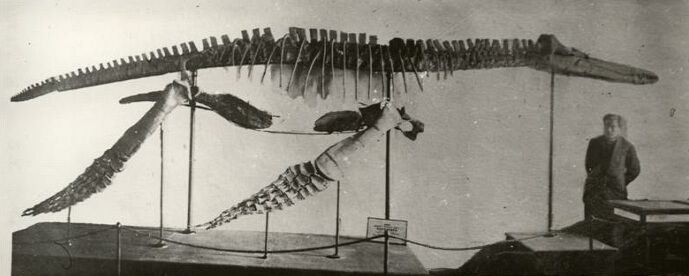
I just came across this image showing 'Pliosaurus' irgisensis when on display at the Pugachevsky Regional Museum (Pugachyov, Russia) in 1941. 1/4
Source: upload.wikimedia.org/wikipedia/ru...
06.07.2025 10:35 — 👍 54 🔁 6 💬 1 📌 0
Saw this two ago in Holzmaden, Germany, where I studied an amazing plesiosaur fossil at the Urwelt-Museum Hauff.
#fossilfriday #art #germany
13.06.2025 11:12 — 👍 9 🔁 3 💬 1 📌 0
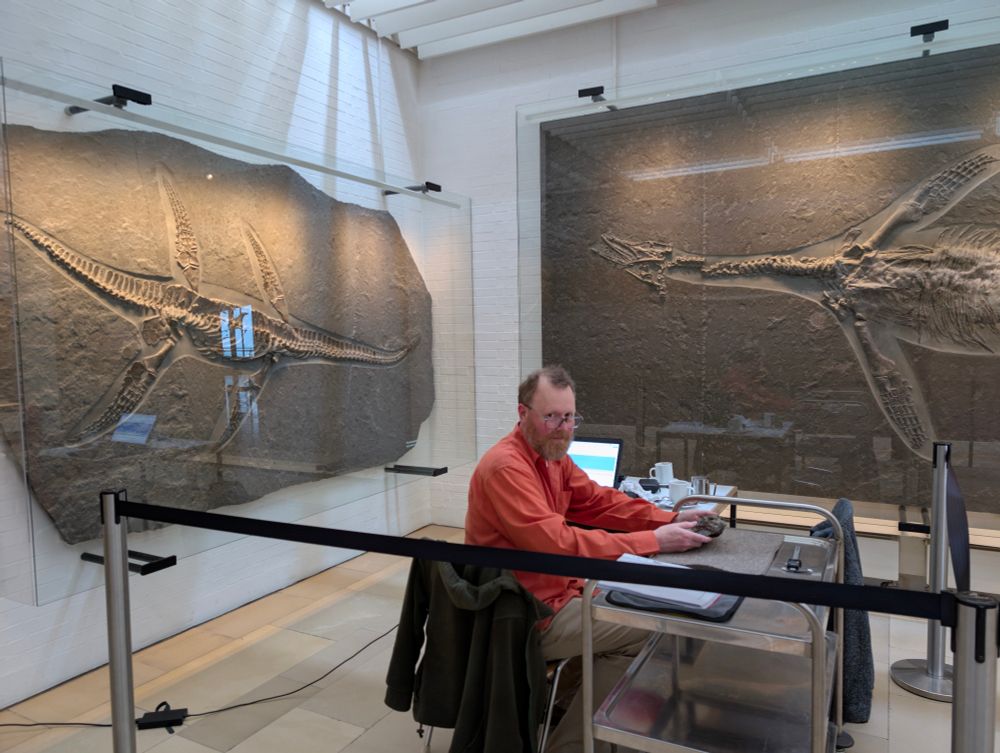
Having a good time at the Urwelt-Museum Hauff in Holzmaden, studying beautifully preserved Lower Jurassic plesiosaurs found in nearby quarries.
#research #science #paleontology #palaeontology
29.05.2025 08:27 — 👍 40 🔁 5 💬 1 📌 0
The paper, led by Jahn Hornung, can be downloaded here:
www.lwl.org/.../Geolo......
The image shows the mandibular dental plates and a reconstruction of Stoilodon lindenbergi (by Jahn Hornung). In the background is a life reconstruction of Brancasaurus brancai (by @joschuaknuppe.bsky.social).
3/3
03.04.2025 17:21 — 👍 1 🔁 0 💬 0 📌 0
The species is the westernmost occurrence of Stoilodon, which is otherwise only known from Russia. S. lindenbergi was collected in the former Gerdemann clay pit that is also the type locality of the plesiosaur Brancasaurus brancai.
#paleontology #biodiversity
2/3
03.04.2025 17:21 — 👍 2 🔁 0 💬 1 📌 0
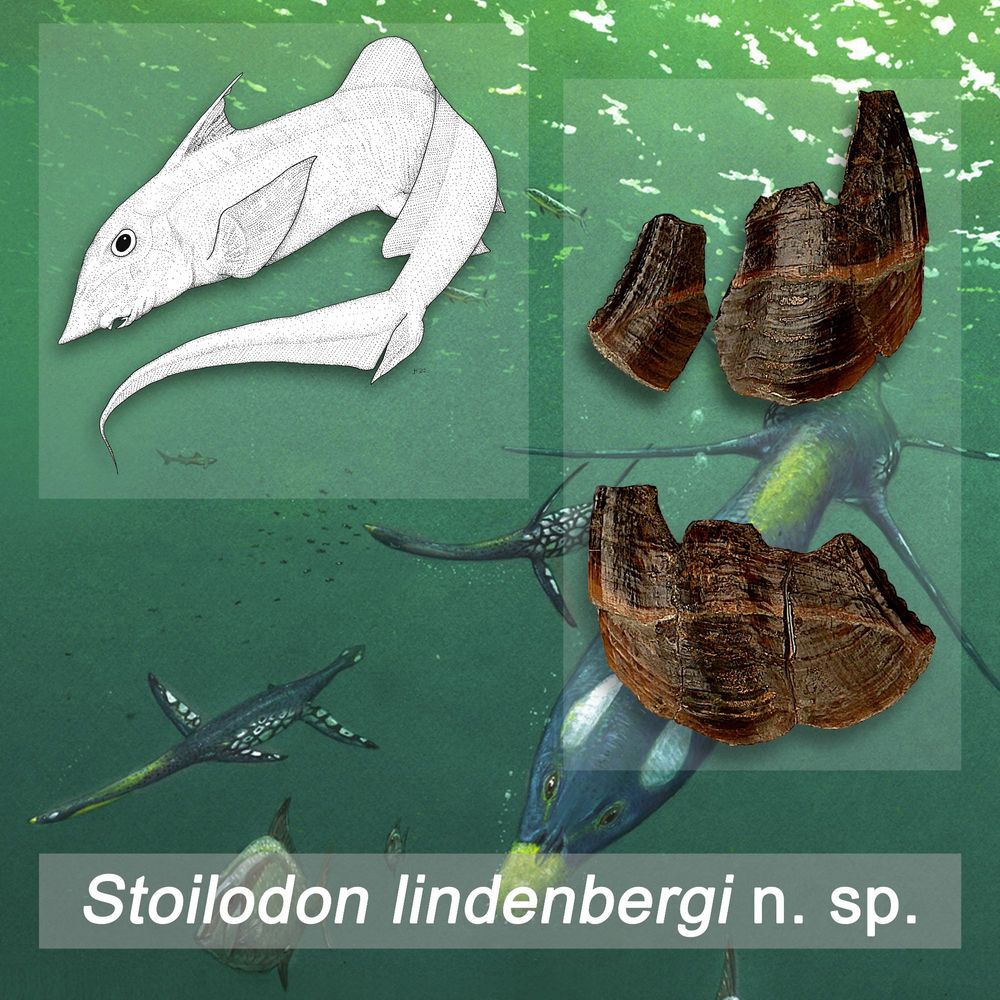
The image shows the mandibular dental plates and a reconstruction of Stoilodon lindenbergi (by Jahn Hornung). In the background is a life reconstruction of Brancasaurus brancai (by Joschua Knüppe).
Please welcome Stoilodon lindenbergi
I'm happy to announce that our paper on Stoilodon lindenbergi, a new chimaeroid species from the Lower Cretaceous of #Germany, is out. We named it after the German singer Udo Lindenberg, born in Gronau in Westfalen where the specimen was found.
#science
1/3
03.04.2025 17:21 — 👍 7 🔁 2 💬 1 📌 0
The new specimen is from an older individual and supports the validity of Plesiopterys wildi. Our study also opens up the possibility of endemism in Toarcian plesiosaurs. 4/4
31.03.2025 13:46 — 👍 7 🔁 0 💬 0 📌 0
Previous studies considered Plesiopterys to be a young individual of Seeleyosaurus guilelmiimperatoris. However, we have recently clarified in our restudy of Seeleyosaurus that these are two different forms. 3/4
31.03.2025 13:39 — 👍 6 🔁 0 💬 0 📌 0
The specimen from the collection of the Urweltmuseum Hauff in Holzmaden, #Germany, was found in 1940 but has been prepared only recently. It is the second fossil known of Plesiopterys wildi. The holotype is a juvenile specimen in the collection of the Staatliches Museum für Naturkunde Stuttgart. 2/4
31.03.2025 13:39 — 👍 6 🔁 0 💬 1 📌 0
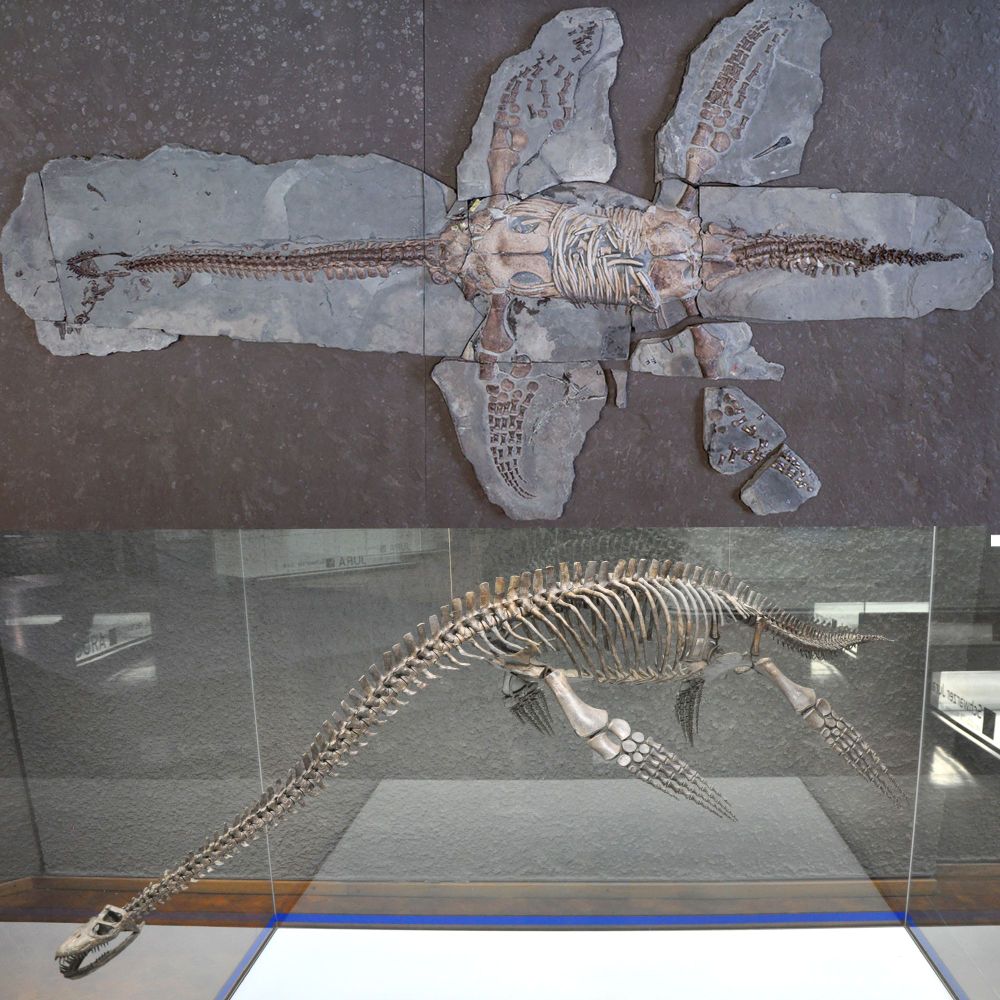
Skeletons of Plesiopterys wildi, a plesiosaur from the Posidonia Shale, Posidonienschiefer, of Holzmaden, Germany. The upper specimen is a skeleton in the Urweltmuseum Hauff collection, the lower specimen is the holotype of Plesiopterys wildi in Stuttgart.
🚨 New plesiosaur paper 🚨
I'm pleased to announce that our paper on the plesiosaur Plesiopterys wildi has been published today in PeerJ: peerj.com/articles/189...
In our study, led by @miguelpmarx.bsky.social, we describe a new and previously undescribed specimen.
#science #research
1/4
31.03.2025 13:39 — 👍 130 🔁 41 💬 2 📌 0
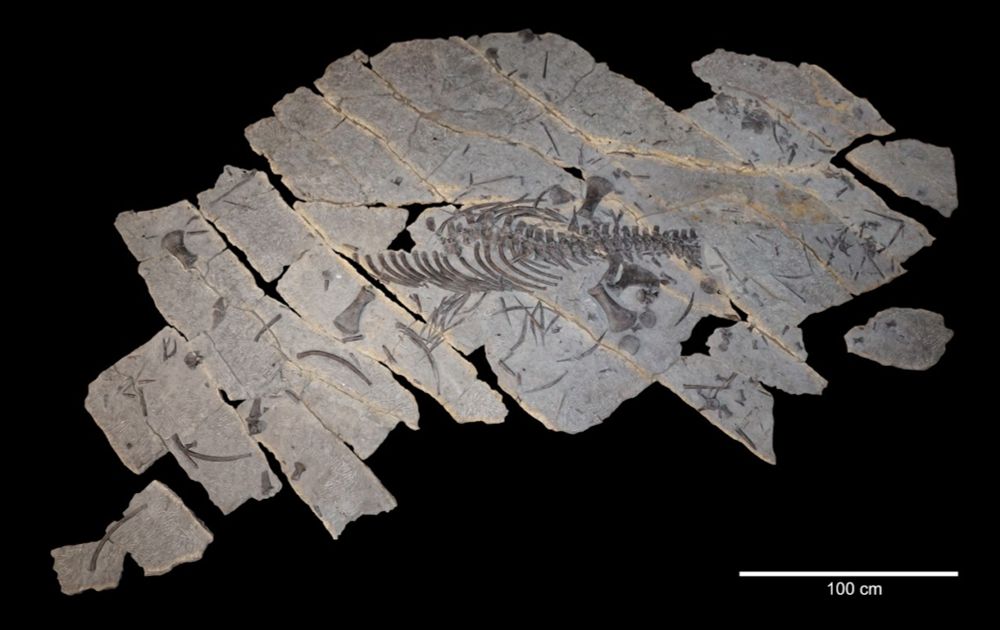
Sachs Vertebrate Palaeontology Research - Franconiasaurus brevispinus, a Lower Jurassic plesiosaur from Germany
Main slab of the holotype of Franconiasaurus brevispinus (BT 011224.00). Collection of the Urweltmuseum Oberfranken in Bayreuth
I just added a page about the plesiosaur Franconiasaurus brevispinus, which I, @danielmadzia.bsky.social and Stefan Eggmaier described last year, to my website. I hope you will find it informative.
www.sachspal.de/franconiasau...
#FossilFriday #Research #Germany #Paleontology
14.03.2025 10:27 — 👍 1 🔁 1 💬 0 📌 0
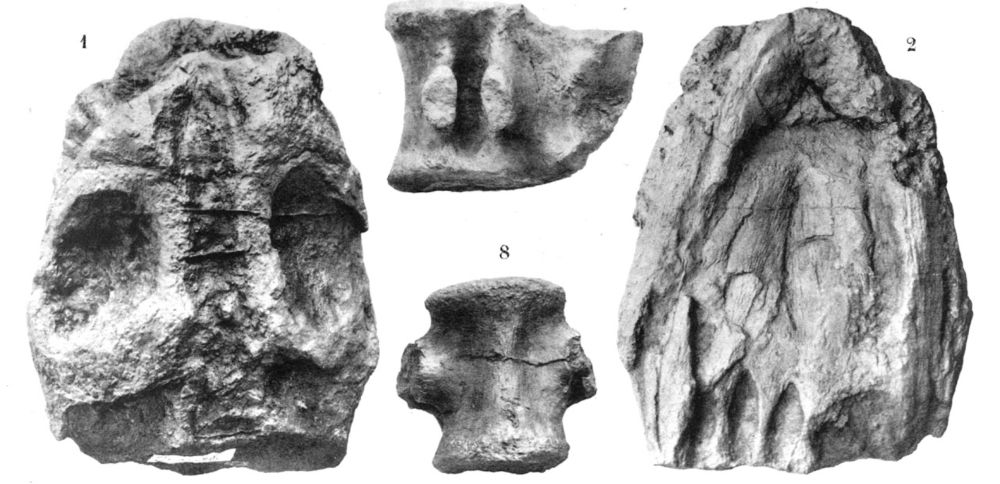
Sachs Vertebrate Palaeontology Research - Lusonectes sauvagei
Lusonectes - a plesiosaur from the Lower Jurassic of Portugal
Last week I had the opportunity to study the plesiosaur Lusonectes sauvagei at the Museu Geológico in Lisbon, and I just wrote this little contribution about the fossil: www.sachspal.de/lusonectes
#fossil #paleontology #research #science #plesiosaur
09.03.2025 18:03 — 👍 2 🔁 0 💬 0 📌 0
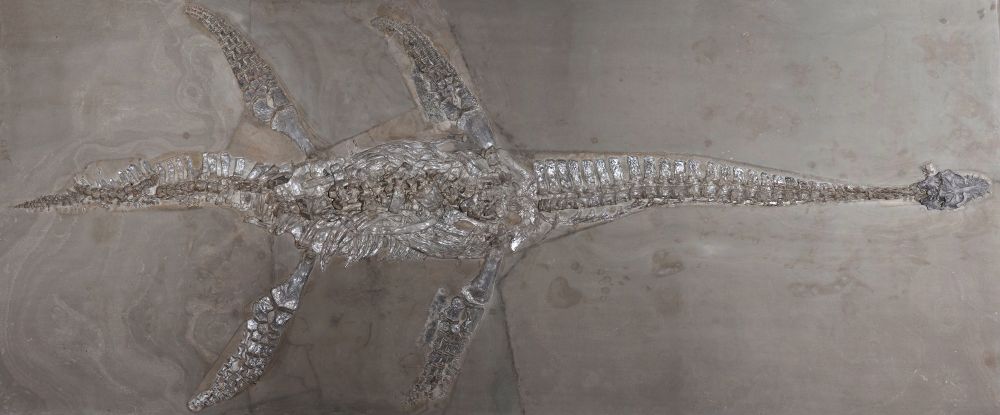
Holotype of Microcleidus brachypterygius from the Posidonia Shale of Germany
This image shows the holotype of Microcleidus brachypterygius, a plesiosaur from the Lower Jurassic Posidonia Shale of Germany that is perfectly preserved and even contains fossilised remnants of soft tissue. University of Tübingen collection.
#fossilfriday #science #germany #paleontology #nature
07.03.2025 11:30 — 👍 34 🔁 7 💬 1 📌 0
This happened prior to fossilisation
22.02.2025 09:02 — 👍 1 🔁 0 💬 0 📌 0
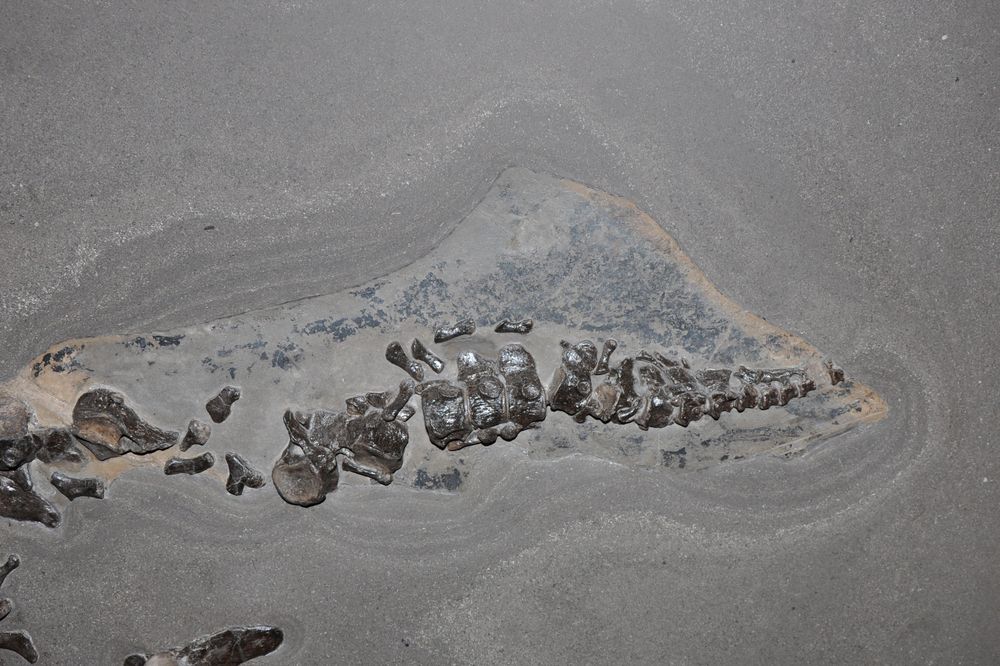
Tail fin of Seeleyosaurus guilelmiimperatoris. Naturkundemuseum Berlin collection
We also discuss previous assignments and show that Plesiopterys wildi is not a juvenile Seeleyosaurus but a distinct genus that inhabited the Posidonia Shale during the Toarcian stage of the Lower #Jurassic.
Link to our study: anatomypubs.onlinelibrary.wiley.com/toc/19328494...
6/6
#ocean #life
21.02.2025 14:00 — 👍 4 🔁 0 💬 0 📌 0
Paleontologist, fossil librarian, amateur astronomer, cat mom
🌌📷⬇️
https://www.astrobin.com/users/tetrameryx/
How do you do, fellow squids? 🌊 We're your frondly Aquarium with a mission to inspire conservation of the ocean. https://www.montereybayaquarium.org
Mostly posts about the art history of paleontology in museums. Exhibit developer at the Field Museum, opinions my own. Proudly from DC. he/him
Website: extinctmonsters.net
Professor of palaeontology @ Université de Liège, Belgium
Director of the Evolution & Diversity Dynamics Lab. I study the biodiversity and extinctions of fossil marine predators
he/him/his 🏳️🌈🏳️⚧️🌻🇪🇺🇺🇦
Marine mammal paleontologist, artist, snorkeler, beachcomber, tidepool enthusiast. Chief paleontologist for Charleston Center for Paleontology.
Zoologist, author, natural historian Dr Darren Naish | Dinosaurs animals evolution | Books: DinosaursHTLE - DINOPEDIA - AncientSeaReptiles. PREHISTORIC PLANET lead consultant AppleTV+ | Mesozoic Art II coming 2025, also DINOCON
https://linktr.ee/tetzoo
Examining the intersection of the history, philosophy, and practice of paleontology | Museum Director, Eagle Scout, National Parks, Fossils
Live From Austin, Texas
#Dinosaur #paleontologist at RBINS (Brussels) specialized in #ornithopod dinosaurs | #paleobiology #paleopathology #evolution #biomechanics. Wannabe scicommer, #TTRPG game master and strong Lovecraftian chultist
http://www.twitch.tv/dicendinosaur
Evolutionary biologist, President @linneansociety.bluesky.social, practitioner of healthy coding-fieldwork balance, human and dog mom, she/her, On-juhlee, not On-jolly
21st-century approaches to fleshing out the past! Mission: to use the structure of past & present animals to interpret evolutionary history...and to share it!
Software engineer with occasional illustration and evolutionary biology work. I make prehistoric comics (https://www.keesey-comics.com) and a website with free silhouettes (https://www.phylopic.org/).
He/him
German paleoartist, he/him, doing extinct critters of all sorts and some spec evo too
Palaeoartist, palaeontologist, author, documentary consultant and creature designer. Not necessarily in that order. More about me at markwitton.co.uk.
Professional paleoartist, concept artist and illustrator.
Brushes and 3d models: https://villes.gumroad.com
villesink@gmail.com
https://linktr.ee/VilleSink
Paleontologist. Mostly working on marine reptiles 🐊 and early tetrapods 🐸. Also doing conservation 🌿, scicomm 💻, aquarium keeping 🦐 and playing distorted guitars 🎸.
Evolutionary biomechanist. Awesome animals, dinosaurs, anatomy, locomotion, computer modeling, http://whatsinjohnsfreezer.com, #DisabledInSTEM. #DAWNDINOS. He/him. Fellow of the Royal Society.
Professional Scientific Illustrator, Paleoartist & Herpetologist 🏳️🌈🦖🦎 Commissions gabuguetoillus@gmail.com He/Him/His https://linktr.ee/serpenillus
Client list includes The BBC Natural History Unit, Apple TV+, National Geographic Magazine, among others
Father & Husband, vertebrate paleontologist, drawer of skeletals. PhD. Instructional faculty at UW-Madison (anatomy & physiology, evolution, dinosaurs). Webpage: www.skeletaldrawing.com

